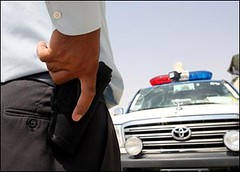By Sgt. Roe F. Seigle 1st Marine Division
BAGHDADI, Iraq — After 30 recent graduates from the Iraqi police academy came to Baghdadi, Iraq, residents in this Saddam-era military housing complex are expressing interest in joining the police force because they are noticing a decrease in insurgent activity.
Marines with the Hawaii-based 3rd Battalion, 3rd Marine Regiment, or “America’s Battalion”, are combating the insurgency with local police officers – who recently received “much needed” new gear to get the job done – pistols, protective vests, rifles and batons to use while patrolling the city’s streets.
Soon they will receive radios and police cars, said Maj. Eric Kelly, 36, the commanding officer of Weapons Company, 3rd Battalion, 3rd Marine Regiment – the U.S. military unit which provides security here and mentors the city’s local police and soldiers. {Click on image for photo details}

1 comment:
Now that soldiers are manning traffic control points in and out of the city and more police are patrolling the streets with Marines, insurgents do not have the same mobility they had months ago to plan and carry out attacks in this city of 30,000 nestled on the Euphrates River northwest of Baghdad, said Kelly.
Recently the police, along with Iraqi soldiers, captured 15 suspected insurgents for attacks against Coalition Forces. They also seized a cache of small-arms weapons in the city.
“We need police here because they will be the ones providing security and stability when Coalition Forces withdraw from Iraq,” said Kelly, a native of Jacksonville, Fla. “We are making continuous progress.”
Kelly said he believes with the progress being made, the turnover of security operations to Iraqi Security Forces will be possible within the next year.
A recent screening for police officers in Baghdadi resulted in more than 30 qualified recruits who will soon be sent to the police academy in Jordan. In recent recruiting attempts, it was hard to get even thirty people to show up, said Kelly.
“The residents are seeing the police officers get paid and supported by the government. This has given them confidence in the Marines and the Iraqi Security Forces because they see we are building their government and protecting them,” said Kelly.
When the Marines arrived in this region of Iraq in March, locals had no confidence in the Marines nor did they support them, said Kelly. Often, residents would walk away from Marines and avoid eye contact with them.
Now, Iraqi soldiers and police, some of whom grew up in this city, are interacting with locals and assuring them they will protect them from insurgents.
But it’s more than just talk – Iraqi police and soldiers are proving their word is true by patrolling the streets night and day and suppressing insurgent activity, said Kelly.
The Marines say the presence of local police has earned the Iraqis’ trust – a complete “one-eighty” from four months ago.
Children eagerly approach and greet the Marines, sometimes hugging their legs in enthusiasm. Adults are no longer afraid to speak with or interact with U.S. and Iraqi military forces. It’s not uncommon to see locals participating in a friendly game of volleyball under the street lights, as opposed to the city’s silent, empty streets during past visits by Marines, said Cpl. Anthony Moran, a 22-year-old Marine from Kaplan, La.
“As long we keep showing people here we care about them, they will support us,” said Moran, a team leader with 3rd Battalion’s Weapons Company. “We often hand out toys and soccer balls to the children who do not have toys. They shake our hands and talk to us every time we go on a patrol.”
Along with the police officers, more than a dozen Iraqi soldiers were assigned to the city of Baghdadi after they completed basic training, said Moran.
The soldiers and police officers are now conducting joint operations throughout the city and are encouraging local leadership, such as tribal leaders and sheikhs, to promote future police recruitments, said Kelly.
“The police and soldiers are working well together,” he said. “They compliment one another on their achievements during missions.”
The joint security operations between Iraqi soldiers, police, and U.S. Marines are keeping the insurgency out of the city, according to 1st Lt. Peter Ankney, Weapons Company’s executive officer.
“The insurgents’ ability to move throughout the battle space has been severely hampered because the Marines, (Iraqi) soldiers and policemen are constantly patrolling the area,” said Ankney, a 26-year-old from Colstrip, Mont. “They are out there 24-7 looking for insurgents and protecting the citizens.”
But the Marines, soldiers and policemen are not developing a false sense of security when they patrol this city of 30,000, Kelly added. The security here is genuine, not just an occasional presence of Iraqi Security Forces through the town’s various neighborhoods.
“They (police officers) are all staying constantly vigilant and responding to any reports of planned attacks before they can be carried out,” said Kelly. “We have Marines training the soldiers and police – it all adds up to Iraqis taking care of Iraqis.”
As 3rd Battalion’s deployment to Iraq’s western Al Anbar Province comes to an end, Kelly said the Marines’ focus will remain the same – “training Iraqi Security Forces to take over their battle space.”
“This has been a humanitarian deployment just as much as it has been a combat deployment,” said Moran. “We are protecting the Iraqi people and helping them develop a new and fair government.”
The Marines from Weapons Company will remain in Iraq until later this year and will be replaced by another Hawaii-based unit.
Post a Comment